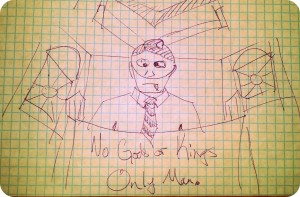What did we do this week?
- Bryce storyboarded some scenes from Bioshock to see how the game conveys motion and story through environment, and found scientific research on GMOs for interaction and visualization data. He also began setting up a scene in Unity and exposed himself to some tutorials on the software.
- Liang investigated research on soil pollution, its causes, and its effects on the earth. She looked into how user actions can be made to cause effects on the Earth, and worked through some correlations between ecological issues.
- Trevor researched correlations between global warming and rising sea levels. He explored how the team could show sea level change through topographical data in ArcGIS, and he started to conceptualize a visual aesthetic for the project.
Achievements and Problems:
- Through discussion of the games we played last week, we found that one key element in storytelling is to ground the player in context and manipulate that context, or environment, in order to propel action and decisions. Our project has gone through some large changes, and we have a much more solid plan for how users will interact with the world from our space elevator. We’ve narrowed our focus on player interaction to the mechanic of ecological dilemmas, giving the player a choice with no clear right answer in an effort to inspire players to examine that most current issues in sustainability and global wellness have strong arguments on both sides. We solidified many ideas for core choices we would like the players to make.
- This week came with the large setback of losing one of our team members, bringing us down to a cast of three. We’re currently working on restructuring our efforts to compensate for the loss, which will mostly include the necessity for one or more of us to learn a good amount of 3D modeling skills. Aside from that, we are working to better understand the technical feasibility of our project, though we will be experimenting more with Unity this week to find out what we can do.
Using the rising sea level as an example, this is what we’re going for:
The world’s landmasses would start out normally. When a user makes a choice that has rising sea levels as a consequence of that decision, we will use topographical data to animate low-altitude areas like Florida and the Brazilian rainforests being swallowed up by the ocean.
Next week, we will continue science topic research and begin to develop topographical maps from national datasets. Each of us will be looking through the Unity asset collection to settle upon a distinct visual style and offset the work we will need to do with modeling. We will create a rough draft of the grand scene and the interior of the elevator itself, and we will make plans of how user choices will impact our core visualizations.
- We scrap the radial movement of the elevator, making it simply an up-and-down ride.
- We cut out the animation, and just have each user interaction change how the Earth looks.
- Instead of having a narrator, we have a real live person in the Cave with the players. (We may end up doing this anyway, because it would be cool)
- We don’t update the visualization until the very end of the questions.
- We don’t have the space elevator move at all.
Ultimately, our worst-case goal is to have a virtual view of the Earth from a very high place, and craft a story to go along with it.
